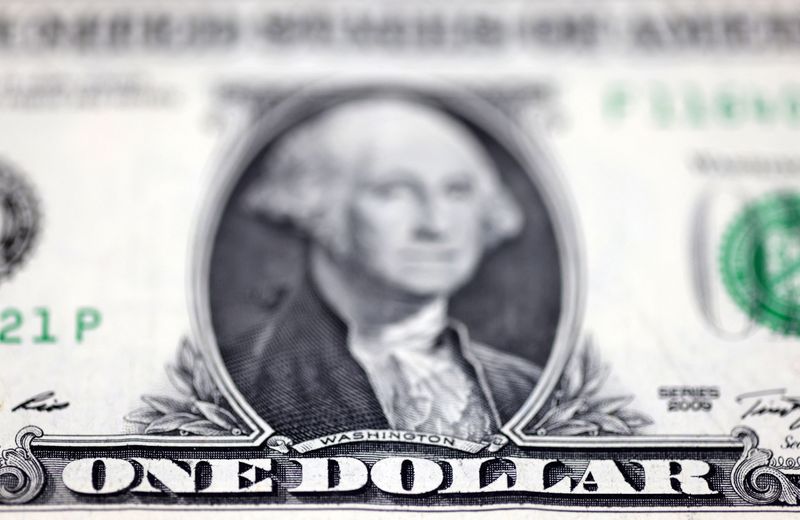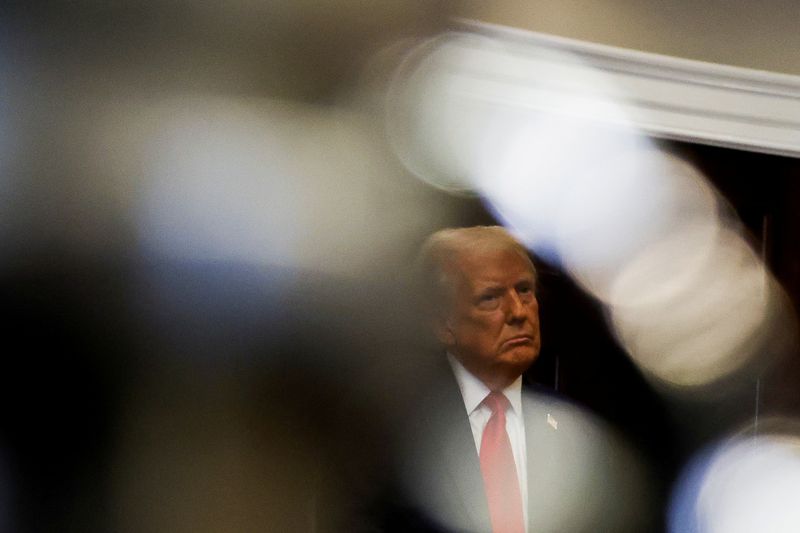
By Vidya Ranganathan and Harry Robertson
SINGAPORE/LONDON (Reuters) -The dollar climbed on Monday and cryptocurrency bitcoin hit a three-month high as a rise in U.S. bond yields and the looming Presidential election continued to impact markets.
Currency moves last week were driven by the European Central Bank’s dovish rate cut and strong U.S. data that pushed out expectations for how fast U.S. rates can fall, particularly if former President Donald Trump wins the presidency.
The dollar index, which measures the greenback against major rivals, was last up 0.17% at 103.65.
It fell 0.3% on Friday as risk appetite picked up broadly across markets after China announced more details of its broad stimulus package, but logged 0.55% gains for the week.
The euro fell 0.16% to $1.0849 and sterling slipped 0.2% to $1.3022.
The strength of the dollar has “in large part been a rates and relative growth story”, said Erik Nelson, macro strategist at Wells Fargo.
“You’ve had some relatively solid U.S. data, starting with the jobs report earlier this month. You’ve had decent retail sales, GDP is tracking pretty well this quarter. On the other side Europe’s not doing quite as well, the ECB is on the dovish side… so it’s been this divergence story.”
Polls showing rising odds of former President Donald Trump winning the Nov. 5 election are also helping the dollar against some currencies, analysts say, since his proposed tariff and tax policies are seen as likely to keep U.S. interest rates high and hurt trading partners.
Bitcoin got a lift from Trump’s improving prospects since his administration is seen as taking a softer line on cryptocurrency regulation. It was last up 0.2% at $68,555, off a peak of $69,487 which took its gains since Oct. 10 to 18%.
YEN DOWN
The yen was down 0.2% at 149.84 per dollar but staying on the stronger side of 150 per dollar after having breached that level briefly last week for the first time since early August.
The clearest way to express the Trump tariff risk was to (buy) dollars versus the euro, Swiss franc and Mexican peso, Chris Weston, head of research at Australian online broker Pepperstone, said in a note.
“Traders need to decide if now is the right time to start placing election trades with greater conviction,” Weston said.
Last week, the yen fell 0.3%, the euro 0.6% and sterling was flat. The Mexican peso fell 3%.
The euro is down more than 3% in three weeks and has fallen through its 200-day moving average, and is parked near a 2-1/2 month low.
The closely-watched gap between U.S. and German 10-year bond yields has widened to around 189 basis points (bps) as U.S. yields have climbed in recent weeks while German ones have declined.
ECB governors at Thursday’s rate-setting meeting made the case for dropping a pledge to keep policy tight as inflation may now turn out lower than anticipated only a few weeks ago, sources told Reuters.
Yields in Britain too have moved against the pound this month on weaker inflation readings and expectations Finance Minister Rachel Reeves will announce a bond-friendly budget on Oct. 30.
The spread between U.S. and gilt yields has gone from being 24 points in sterling’s favour to 3 points negative.

With no major economic events due this week, market focus will be on corporate earnings and the U.S. election.
Japan will hold a general election on Sunday, Oct. 27. While opinion polls vary on how many seats the ruling Liberal Democratic Party (LDP) will win, markets have been sanguine that the LDP along with junior coalition partner Komeito will prevail.
This post is originally published on INVESTING.



